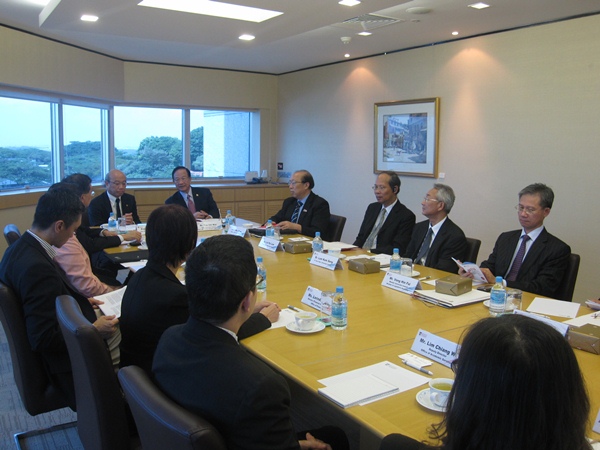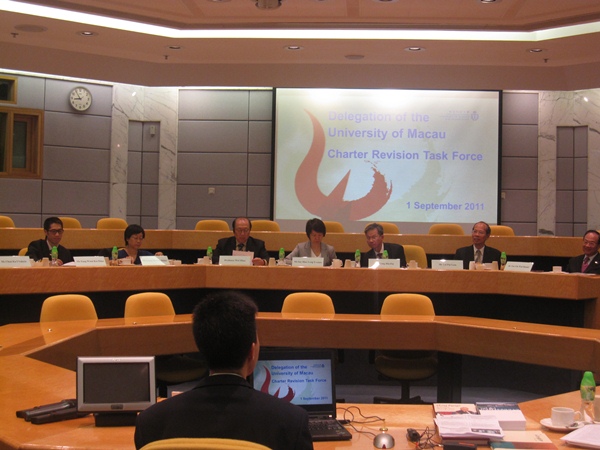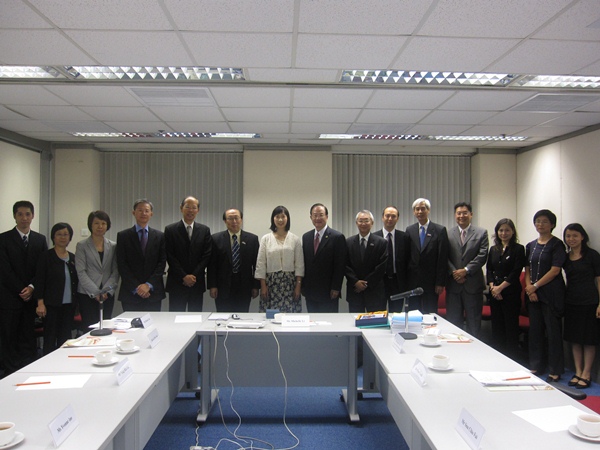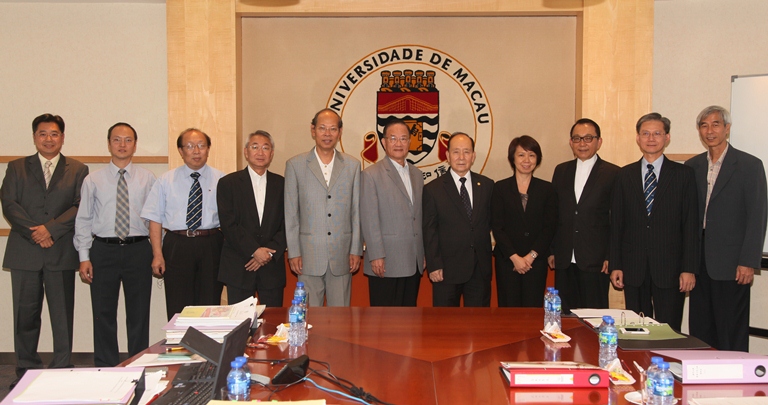To better support the development of the University of Macau (UM) after its relocation to the new campus on Hengqin Island as well as to create conditions for UM to achieve the objective of becoming a world-class institution, the Macao SAR government set up the UM Charter Revision Task Force in June 2011. Recently the task force visited Hong Kong and Singapore for the purpose of learning more about the reforms of governance modes of public higher education institutions (HE institutions) there as well as the reasons thereof, and reported relevant findings at the first UM Charter Revision Task Force Meeting afterwards. Task force members noted that in recent years HE institutions in both Hong Kong and Singapore are striving towards world-class institutions, and granting more autonomy in governance is one of the key measures taken by the local governments towards the realization of this objective; and the purpose of revising the UM Charter is to increase UM’s international competitiveness and help it better meet future challenges.
Thanks to the support of the Macao SAR government and the local community, the Judicial Regime of the University of Macau was passed by the Legislative Assembly of Macao SAR in September 2006, while the Charter of the University of Macau and the Personnel Statute of the University of Macau were also approved by the chief executive of Macao SAR. Afterwards UM began to adopt a governance structure where the university council is the supreme governing body, in line with international practice, and began to progress towards modernization and internationalization step by step. However, as a public legal person, UM is still subject to, among others, a public administrative system, a public financial system and laws and regulations governing public servants, which results in a complicated situation where governance by the University Council and governance by government systems run parallel with each other. This “dual governance” causes UM such problem in accountability, autonomy and some administrative operations that it stifles the university’s development. In June 2011 the SAR government announced the establishment of the UM Charter Revision Task Force, hoping that a second Charter revision can help address relevant problems, better support UM’s development after its relocation to the new campus, and create necessary conditions for UM to pursue the goal of becoming a world-class institution.
Members of the UM Charter Revision Task Force include Tse Chi Wai (Chair), Iao Man Leng, Lei Pui Lam, Lam Kam Seng, Anabela Fatima Xavier Sales Ritchie, Tong Chi Kin, Leong Heng Teng, Vong Hin Fai, Yeung Tsun Man, Wei Zhao, Sou Chio Fai and Lai Iat Long (Secretary). To better understand the reforms of governance modes of public HE institutions in neighboring regions in recent years and also to borrow relevant experience, the task force went on a four-day visit to Hong Kong and Singapore from 31 August to 3 September. The task force successively visited higher education authorities in Hong Kong, Hong Kong University of Science and Technology, higher education authorities in Singapore, and Nanyang Technological University, Singapore. Discussions mainly revolved around how autonomy and accountability in the governance of HE institutions, the nature of legal person, and funding are related to the objective of developing world-class institutions. The fact that the visits by the task force were taken very seriously by relevant government officials and university heads in Hong Kong and Singapore shows that the current development of UM has aroused great attention from the HE sectors in these regions.
At the first UM Charter Revision Task Force Meeting held on 6 September, UM representatives reported the various operational difficulties UM is grappling with, including the relationship between the SAR government and UM where the latter is governed by the former, the composition and operation of the University Council, the applicability of various public laws and regulations, as well as issues concerning the financial, personnel and administrative operations of UM. At the meeting, task force members also reported and summed up relevant findings of the 4-day visit to Hong Kong and Singapore. According to government officials in Singapore, the forerunners of the National University of Singapore and Nanyang Technological University, Singapore, were directly governed by the government and were subject to public administrative laws and regulations. In 2004 the government of Singapore decided to corporatize the two public universities and introduce a corresponding accountability system to allow the two universities more administrative and financial autonomy so that they can better cope with the rapidly-developing and fiercely-competitive environment and achieve world-class excellence in certain academic realms on the back of their respective unique strengths. After the corporatization, the two institutions began to adjust the flexibility of their salary systems based on market demand, and introduced healthy competition mechanisms. To encourage private donations to the universities, the local government initiated a generous “government fund matching” policy, enabling universities to develop rapidly with the joint support of the government and the community. In Hong Kong, the University Grants Committee of Hong Kong SAR, which is of a non-statutory body , coordinates higher-education-related matters on behalf of the SAR government, and it is mainly responsible for allocating funds to relevant institutions and assisting with the strategic development of higher education. HE institutions in Hong Kong have the freedom to formulate academic development plans and plan about how to utilize resources based on their respective missions and visions, but are required to each submit a complete academic development plan every three years as a basis for future fund allocation. They also need to undergo a quality review by external experts every five years. In 2003, the Hong Kong SAR government began to allow universities to de-peg their salary systems from the salary system for civil servants, and implemented a limited “government fund matching” policy, to encourage community participation in the development of HE institutions. In terms of supervision, with a “sunshine supervision system” in place, HE institutions in Hong Kong are obliged to disclose all accounts, and meanwhile the media, the Legislative Council, the Audit Commission, and the Independent Commission Against Corruption all play a supervisory role, which combine to make it unnecessary for the Hong Kong SAR government to interfere with any financial, operational, or other internal affairs of HE institutions.
Tse Chi Wai noted that in both Singapore and Hong Kong, HE institutions have the power to handle their internal affairs at their own discretion, but they are driven by their own missions and global competition, which, plus the fact that the governance structure and powers of the HE institutions are subject to relevant laws and regulations and that a set of extremely rigorous quality assurance and self-evaluation system is in place, combine to make it reasonably unlikely and difficult for HE institutions to abuse their autonomy. Tse added that government officials and university management personnel in both Singapore and Hong Kong hold that these reforms in recent years have granted more autonomy to HE institutions and have made them better equipped to pursue the goal of becoming world-class institutions. Tse further remarked that the information obtained—and the relationships established—through the 4-day visit by the task force will shed inspiringly new light on—and will be of enormous benefit to—both Charter revision and the future development of UM.
Leong Heng Teng remarked that the four-day visit shows that both the governments of Hong Kong SAR and Singapore are constantly studying, reviewing and pushing ahead with the exercise of developing local HE institutions into world-class institutions. Leong added that the 4-day visit has deepened his understanding of the development and governance modes of HE institutions worldwide and the insights thus obtained are of enormous relevance to the revision of UM Charter.
Lei Pui Lam noted that it is an inexorable trend worldwide to delegate power and grant more autonomy to HE institutions so they can quickly respond to international competition and the needs of society; however, that begs the question: How does one strike a balance between power delegation and accountability? The answer is putting into place a set of extremely rigorous accountability system for supervisory purposes. Lei added that given the current situation, it is necessary to review the UM Charter in order to come up with a more open Judicial Regime and Charter that can better support the future development of UM and ensure that UM is truly in line with international practices. Lei is of the opinion that in terms of the direction in which Charter revision should take, considerations should be given to the proper handling of the relationships between adhering to established principles and allowing flexibility in the concrete implementation of the principles, between delegating powers and imposing certain restrictions, and between identifying existing problems and optimizing solutions.





